
4 hours ago
Billy Porter's 'Christmas Karma': How a Queer Icon Found Refuge in Gurinder Chadha's Wildly Eclectic Holiday Reimagining
READ TIME: 5 MIN.
When Billy Porter got the call from director Gurinder Chadha, it wasn't just another acting opportunity. It was, in Porter's own words, exactly the kind of Christmas karma he needed.
The Tony Award-winning actor and cultural icon recently sat down to discuss his involvement in"Christmas Karma," an audacious holiday film that reimagines Charles Dickens'"A Christmas Carol" for contemporary audiences. What emerged from that conversation was far more than a standard press junket—it was a glimpse into how one of queer culture's most beloved figures navigates resilience, community, and the unexpected grace of being exactly where you need to be.
Porter's story about landing the role carries a weight that extends beyond typical Hollywood anecdotes."I had just been unceremoniously scrapped from another movie and the very next day I got an email from Gurinder, asking me to be in this film," he explained, describing the timing as serendipitous."It's exactly where I needed to be. The other thing had to move out of the way so that I could be a part of this extraordinary retelling of this classic."
For queer audiences who have watched Porter's career arc—from his groundbreaking role in"Pose" to his red carpet fashion moments that redefined gender expression in mainstream entertainment—this narrative carries particular resonance. Porter has never shied away from discussing his personal struggles, including his HIV status and his ongoing journey with health challenges. His ability to articulate vulnerability while maintaining his signature charisma has made him a figure of profound importance to LGBTQ+ communities worldwide.
The rejection he experienced before receiving Chadha's email isn't unusual in an industry that remains, despite progress, often hostile to queer artists and artists of color. Yet Porter's framing of the rejection as a necessary clearing of the path speaks to a spiritual and emotional maturity that has become hallmark to his public persona.
What makes"Christmas Karma" genuinely noteworthy isn't just Porter's involvement—it's the sheer audacity of the ensemble Chadha has assembled. The film features Eva Longoria as the Ghost of Christmas Past, Boy George as the Ghost of Christmas Future, and Hugh Bonneville as Marley, alongside a deliberately eclectic mix that includes"EastEnders" star Danny Dyer as a singing cab driver, British singer Pixie Lott, and"Bridgerton" star Charithra Chandran.
The casting itself becomes a statement. By bringing together LGBTQ+ icons like Porter and Boy George alongside mainstream British television fixtures and international stars, Chadha is constructing a cultural conversation. This isn't a film designed to appeal to a narrow demographic—it's deliberately, unapologetically expansive.
Porter's assessment of his co-stars reveals the warmth and professionalism that characterizes his approach to collaboration. When discussing Pixie Lott, he simply stated:"Pixie is just divine." It's a small comment, but it reflects the kind of genuine appreciation and camaraderie that queer artists often cultivate with allies and fellow community members in spaces where they can be authentically themselves.
"Christmas Karma" itself carries thematic weight that feels particularly relevant to contemporary audiences. The film follows Eshaan Sood, a right-leaning, wealthy businessman described as someone who"hates refugees," through a transformative journey orchestrated by supernatural visitations. It's a premise that updates Dickens' morality tale for an era of political polarization, xenophobia, and economic inequality.
For queer audiences, there's particular significance in a narrative about transformation and redemption. The LGBTQ+ community has long understood the power of stories about change—both personal and societal. Whether it's coming out narratives, stories of acceptance, or tales of individuals overcoming prejudice, transformation is central to queer cultural mythology. A contemporary"Christmas Carol" that centers on someone learning to see the humanity in those he's rejected carries obvious parallels to the journeys many LGBTQ+ people have witnessed in their own families and communities.
Beyond the film itself, Porter's recent life circumstances add another layer of meaning to his participation in"Christmas Karma." He has been recovering from sepsis, a life-threatening condition that required significant medical intervention and recovery time. When asked about his upcoming holiday plans, Porter shared that he was"looking forward to resting" and spending Christmas with his boyfriend Eric Anderson, whom he began dating two years after finalizing his divorce from Adam Smith.
This personal context—recovery, new love, the deliberate choice to rest and prioritize wellbeing—speaks to themes that resonate deeply within LGBTQ+ communities. For decades, queer people have had to fight for the right to care for themselves and each other, to prioritize health and relationships in the face of systemic neglect and discrimination. Porter's openness about his recovery and his new relationship models the kind of self-care and vulnerability that queer culture increasingly celebrates.
Director Gurinder Chadha, known for her culturally specific storytelling in films like"Bend It Like Beckham," brings her distinctive sensibility to this holiday reimagining. Hugh Bonneville, reflecting on his decision to participate, noted that working with Chadha was itself a form of homage."Having worked with her, I know what a passionate creature she is. Then it comes across in every line of the script how much this means to her. So to turn up for a day and pay homage to the great Gurinda was a pleasure."
Chadha's approach to casting—deliberately bringing together performers from different generations, backgrounds, and career trajectories—suggests a filmmaker interested in creating spaces where diverse voices can coexist and collaborate. For queer artists like Porter, who have often had to navigate industries that marginalize them, working with directors who actively seek out and celebrate difference becomes an act of professional and personal validation.
In a cultural moment when LGBTQ+ representation in mainstream entertainment remains inconsistent and often tokenistic, stories about queer artists finding meaningful work—and speaking openly about the emotional and spiritual dimensions of that work—carry particular weight. Porter's willingness to discuss his recent rejection, his health challenges, and his current happiness offers a counter-narrative to the often-sanitized versions of celebrity life that dominate entertainment media.
The film itself, with its deliberately eclectic cast and contemporary political subtext, suggests that holiday entertainment can be both commercially appealing and culturally substantive. It's a reminder that stories about transformation, redemption, and human connection aren't dated relics of Victorian literature—they're perpetually relevant, especially in times of division and uncertainty.
For queer audiences, watching Billy Porter speak about finding exactly what he needed at precisely the right moment—and doing so with grace, humor, and authenticity—is itself a form of cultural nourishment. It's a reminder that resilience, community, and the possibility of transformation are not just themes in stories like"Christmas Karma." They're lived realities for those who continue to navigate a world that doesn't always make space for them, but who create that space for themselves and each other anyway.






